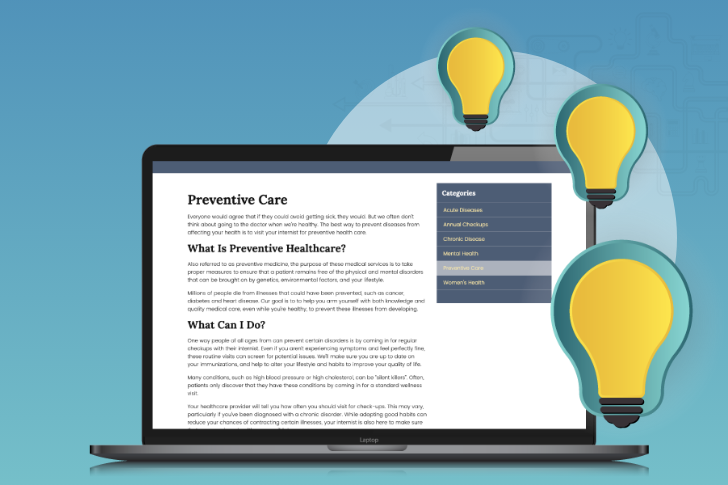A Quick Way to Boost Your Search Rankings
Search engine optimization (SEO) increases your visibility on search engines like Google or Bing.
In this article, we’ll cover a few important things you can do to get this process started.
Even basic adjustments are more than many practices implement and will be enough to put you at an advantage.
HTML Tags: How to Display a Webpage
HTML tags tell a web browser how to display your web page. You won’t see these tags unless you open up the source code, but we’ve included some examples.
<Title> Tags
These tags help search engines categorize your content. For example, if you load Officite’s website, you’ll see:

A <title> tag should be between 10 and 70 characters, contain the name of your practice, and 1-2 keywords you want to rank for in search results.
<Meta> Description Tags
These tags help a search engine understand the content of your page. They are often used in the description text blurb in search results.
A <meta> description tag should be a concise summary of your practice and be at least one sentence (but can be a short paragraph).
Make sure to include at least one keyword you want to rank for in search results.
Officite <meta> description code example:
<meta name="description" content="Officite provides mobile-responsive websites, search engine optimization, social media and reputation management for medical and healthcare practices." />
Officite <meta> description in Search Results

<h1>, <h2>, <h3>… Header Tags
Header tags tell a web browser and search engine how a webpage is organized. Search engines use this information to decide if your website matches what a user is searching for.
The bold subheadings in this article are examples of header tags and describe the topic of that section.
Links Help Search Engines See the Big Picture
There’s another aspect of your website that search engines look for: links.
The first type of link to consider is the backlink.
Backlinks Show People Trust You
Backlinks are what they sound like: a link back to your site from an outside website.
Backlinks come from:
- Blog articles
- Online directories and listings
- Bing business listings
- Online review websites
- Google Business listings
- Map applications
- Mobile applications
Backlinks are important because they show search engines that other people trust your website.
Search engines assume that sites with a higher number of backlinks are more useful and authoritative.
Building helpful content and backlinks over time will help you stand out from the competition.
Use URLs You Can Actually Type
Or a “friendly” URL.
A friendly URL is a web address that’s easy to read, type into the address bar, and has keywords that describe the content of the page.
This makes it easier for people to remember the website address and for search engines to know what your website is about.
An example of a friendly URL we use on our company contact page is: https://www.officite.com/contact-us/
An example of a “non-friendly” URL is: www.[company].com/section/support/default.aspx?id=1&lang=en
Almost impossible to type or remember.
Use Keywords Across Your Entire Online Presence
The next factor is to use consistent keywords.
Keyword constancy means that the keywords you want your webpage to rank for are distributed across your <title>, <meta>, and <header> tags, link address, and in the actual content on your webpage.
This ensures that the keywords you want to rank for are front and center throughout your webpage. And search engines will have an easier time matching what users are searching for with your content.
Freshen Your Content Once a Month (At Least)
Make sure to create or refresh your website on a regular basis. This will keep search engines interested in your website.
You should update your website as often as you can – even if it’s a one-page blog article or a simple update about your practice. And update or refresh your content at least once a month.
A Brief Summary:
- Search engine optimization makes your website more visible search engines.
- Use keywords in your HTML tags to help users and search engines understand your content
- Search engines link backlinks, so consistently build them.
- Use a few targeted keywords across your entire online presence to help search engines connect you with users.
- Update or refresh your content at least once a month to keep search engines and users interested in your website.
Next Step
Skim through this article one more time with your practice website and be sure to follow the recommendations in this article.
If you have any questions about your practice’s search engine optimization and website, contact Officite today.



